, 0°
Wind: mph
MONTICELLO, NY — “It was intimidating; it’s a boys club, a whole lot of men competing for money, very hungry and everyone wants to win,” said Lauren Tritton, a harness driver at Monticello Raceway. She recently relocated stateside with her husband Shane from their hometown in Australia.
Stay informed about your community and support local independent journalism.
Subscribe to The River Reporter today. click here
This item is available in full to subscribers.
Please log in to continueNeed an account?
|


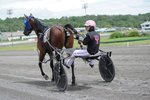
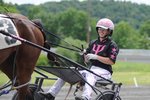
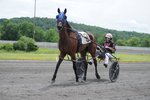
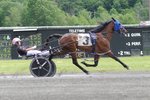
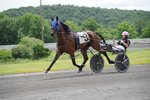
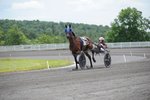


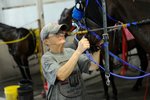
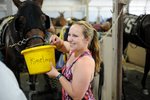
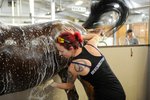
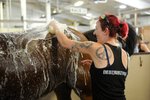
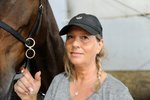

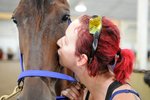
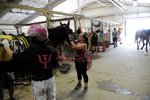
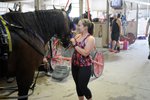
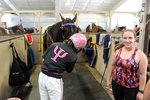
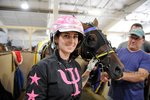
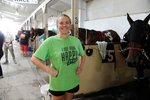
Talking sports
MONTICELLO, NY — “It was intimidating; it’s a boys club, a whole lot of men competing for money, very hungry and everyone wants to win,” said Lauren Tritton, a harness driver at Monticello Raceway. She recently relocated stateside with her husband Shane from their hometown in Australia.
The 28-year old is one of the emerging female harness drivers in the United States, and before moving back a couple of years ago with her husband/trainer, the duo were considered to be at the top of the sport “down under.”
Unlike in the land of koalas and ‘roos, where women harness drivers are common, in America they are a rather rare breed. But at the local harness track, Tritton said, she has been welcomed into the close-knit fold by her male counterparts.
“They have accepted an adrenaline junkie female who also loves to win in their sport, [but] it’s hard for the boys… I’ve done this before. It wasn’t as bad as I expected. The boys have been extremely respectful,” she said.
Back in Australia, Tritton started out riding equestrian before switching a saddle for a seat on a two-wheeled sulky. On one memorable day of racing, she won back-to-back events, first “on a horse and then behind one,” later setting numerous records as a female harness driver.
“It’s an adrenaline rush, it just gets the blood pumping,” she said of harness racing.
On June 20, in the wake of a downpour, Tritton aced the field in her two races, posting a 1:58.2 mile behind Rock the Casbah in race #4, and in race #6, a 1:56.4 mile with Wiggle My Cookie.
A special shout-out to veteran track photographer Geri Schwarz for helping this sports scribbler make some sense of all the results.
Meanwhile, while Lauren was out on the track, Shane Tritton had a few words to say about their involvement in the sport in Australia, noting he was “one the leading trainers and she was one of the leading drivers.”
“In Australia, it’s very normal for the girls to drive against the boys in open company,” he said, adding that one of Lauren’s biggest wins was taking first place at the 2019 Victoria Derby.
“She’s showing the boys what she’s capable of,” he said of their recent move from Oceania to the States. “It’s a big deal for females, and she’s hoping she can inspire other girls to do the same.”
Walking around the paddock at Monticello Raceway, women are a highly visible presence in the local and history-rich harness racing scene, from grooms and trainers to drivers.
Alyssa Palinkas, a 30-year-old groom from Montgomery, works as a groom in the raceway paddock.
“I get them ready to warm up, strip and bath them after the races, and at the farm turn them out every day so they can have a little field time, get them ready to jog, set up their grains, and on weekends do their stalls,” she said in describing the day-to-day duties of a harness groom.
Palinkas recalled that several years ago she worked at a dollar store, when an opportunity “came out of nowhere” to try her hand at grooming race horses, and “I was hooked… I love the family atmosphere, we all root for one another.”
Monica Eriksen of Slate Hill is a 50-year-old trainer and driver. She hails from Norway, where her father Jomar Blekken was one of the country’s best-known trainers.
In 1992 she came to the U.S. to work for harness driver Trond Smedshammer as a trainer and groomer before moving up to the driver’s seat.
“The guys do not give me any breaks,” she explained, adding, “When you go out there it’s full speed, and it doesn’t matter who you are; it doesn’t make a difference.”
These days, Eriksen has five horses at Monticello Raceway, “four girls and a boy.”
Twenty-three-year-old McKenzie Sowers grew up in New Brunswick, Canada, part of a harness-racing family, and was around racing horses “ever since I could walk,” doing evening chores in the barn after school.
“My grandparents Phil and Joan Sowers, and Dean and Iris Bustard, met as teenagers and married into the sport,” she recalled, noting that her brother McGuire Sowers is Monticello Raceways’ leading driver.
Today, when not driving at Monticello on Thursdays and at the Meadowlands on Fridays, Sowers works as an LPN while nearing completion of her RN degree.
“The pro drivers support me a lot, telling me what I can do better, and what I did well, [but] my brother is more critical,” she said.
So what’s it like to pilot a harness-racing horse around a track?
“Your heart pounds going behind the gate, you feel the hoofbeats, the horses breathing, and everybody urging their horse on,” replied Sowers.
And of women in the sport of harness racing?
“Women are the backbone of racing, they really are,” she said. “The grooms, trainers and a lot of the drivers.”
Related stories

Comments
No comments on this item Please log in to comment by clicking here